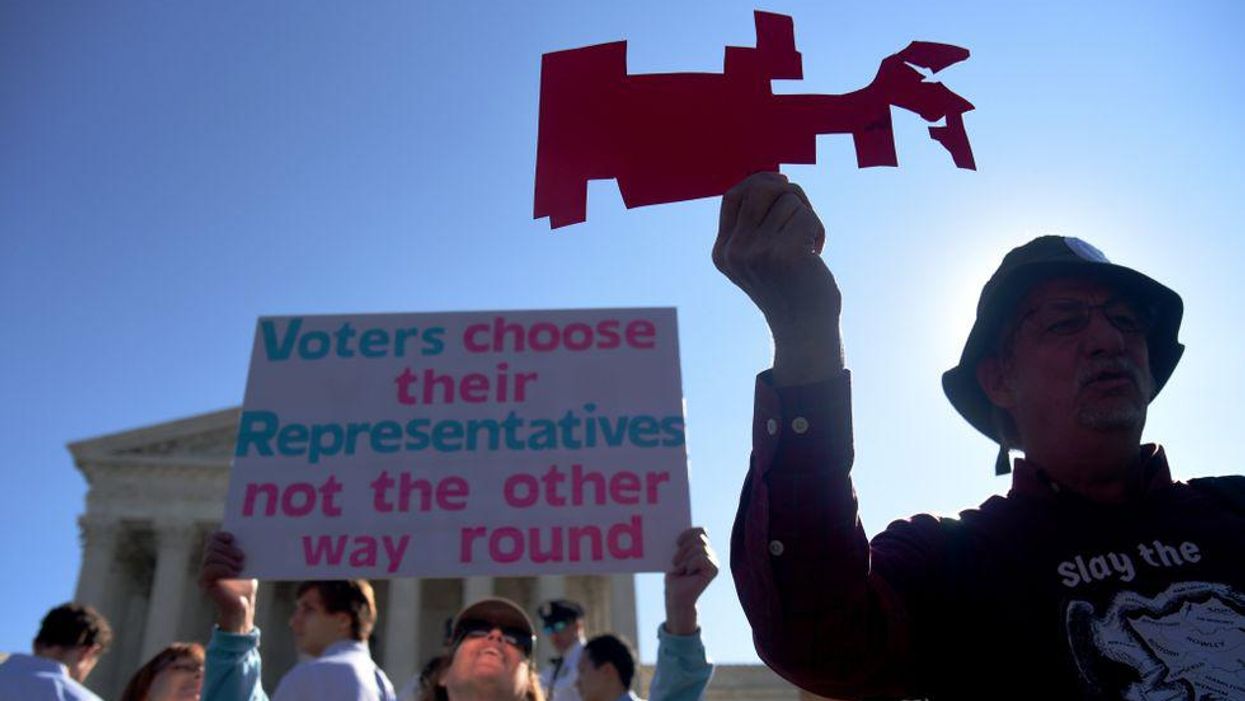Gorrell is an advocate for the deaf, a former Republican Party election statistician, and a longtime congressional aide. He has been advocating against partisan gerrymandering for four decades.
"It's always encouraging to see great people like Eric Holder fighting to end Republican gerrymandering." — Democratic National Committee Chairman Tom Perez, Aug. 2, 2019.
For the past year, Holder's National Democratic Redistricting Committee, the Democratic Congressional Campaign Committee, the Democratic Governors Association, the National Democratic Redistricting PAC, EMILY's List, America Votes and All On The Line have persuaded their supporters to write thousands of email messages, letters to the editor and opinion pieces claiming the creation of independent redistricting commissions in their states could end Republican gerrymandering by the end of 2022.
But that's just not true.
As Bryan H. Wildenthal wrote for the legal news site Jurist: "A fact shockingly ignored in most news coverage is that some key provisions on gerrymandering would not even take effect until a decade from now — after the 2030 census!"
And, as New York Times columnist Ezra Klein explained, "It would also ban partisan redistricting and force states to use independent commissions to draw congressional lines (although this would not, sadly, take effect until after the 2030 census)."
CNN's Chris Cillizza echoed that analysis when he wrote: "And, even if the legislation did make it through the Senate — and Biden signed it — the redistricting reforms wouldn't kick in until the 2030 Census. Which is a very good thing for Republicans."
Let us check the effective date in the Senate's version of the For the People Act. It states, "This subtitle and the amendments made by this subtitle shall apply with respect to redistricting carried out pursuant to the decennial census conducted during 2030 or any succeeding decennial census."
In an email to me, Wildenthal wrote, "The result will be that Republicans will gerrymander to their heart's content in Texas, Florida, North Carolina, and Georgia (where they have far more seats to play with), and leave Democrats in the dust. They will lock in control of the House for the next decade even though Democrats may well win the House popular vote (as they did in 2012)."
Interestingly, Democratic Rep. Zoe Lofgreen of California has not yet reintroduced her redistricting reform bill in the current Congress session (for her ninth attempt since 2005). Each time it has been submitted, it has died in committee because it has lacked adequate support among leadership to advance. The public might not know that her last bill, the Redistricting Reform Act of 2019, is identical to the redistricting provisions of the House version of the For the People Act. The exception is the change of the effective date, replacing 2020 with 2030.
These Democratic-related organizations have not informed their supporters about the new change of the effective date.
Should all 50 states adopt independent redistricting commissions by the time of the 2022 elections? Definitely yes. Look at the Maryland example.
Maryland has two dueling redistricting commissions. In his executive order, Republican Gov. Larry Hogan established the Governor's Citizen Redistricting Commission. Meanwhile, the top Democratic leaders in the General Assembly launched the Legislative Redistricting Advisory Commission to draw new congressional and legislative district maps.
In his Duckpin blog, Brian Griffiths wrote, "While the Governor's Redistricting Advisory Commission is designed to help the people, the Legislative Redistricting Advisory Commission is designed to help politicians. The difference could not be more clear." He showed the credibility difference between the two:
- The governor's commission has three Democrats, three Republicans and three independents. None of the nine members are elected officials.
- The legislative commission has five Democrats and two Republicans. Six of the seven members are elected officials.
Notably, President Biden did not mention redistricting reform while delivering a major speech on voting rights in Philadelphia on Tuesday, but he must know about the effective date.
Oddly, President Barack Obama did not push the Lofgren bill during his first two years in the White House, when fellow Democrats controlled the House and Senate. At the time, it seemed his party would do well enough in the 2010 midterms to dominate redistricting for the decade now coming to an end.
It turned out the opposite way. A Republican wave that year (fueled partly by fundraising for the Republican State Leadership Committee's Redistricting Majority Project) resulted in all GOP state governments getting to draw almost half the 435 congressional districts the next year while all Democratic governments drew about 50. This action is one of Obama's most embarrassing moments.
Wildenthal wrote, "I could not agree more strongly that it was a tragically missed historic opportunity for Obama and the Democrats to enact lasting reform to ban gerrymandering in 2009-10. I suppose they stupidly assumed they would have the upper hand after the 2010 election. We know how that worked out."
I believe his one-page legislative proposal, the "Defend Elections and National Democracy (DEFEND) Act," could be an excellent solution. It would:
- Block all state restrictions on voting rights or other state laws affecting federal elections, enacted after Jan. 6, 2021, unless such laws were passed with bipartisan support.
- Invalidate all partisan and abusive state legislation (whether Republican-sponsored or Democratic-sponsored) attacking voting rights or threatening election integrity.
- Block any state map seeking to gerrymander districts for the U.S. House of Representatives on a partisan basis, and encourage other states to adopt independent or bipartisan commissions.
I ask advocates of redistricting reform to spread the word on the correct effective date and to consider the DEFEND Act.




















Trump & Hegseth gave Mark Kelly a huge 2028 gift